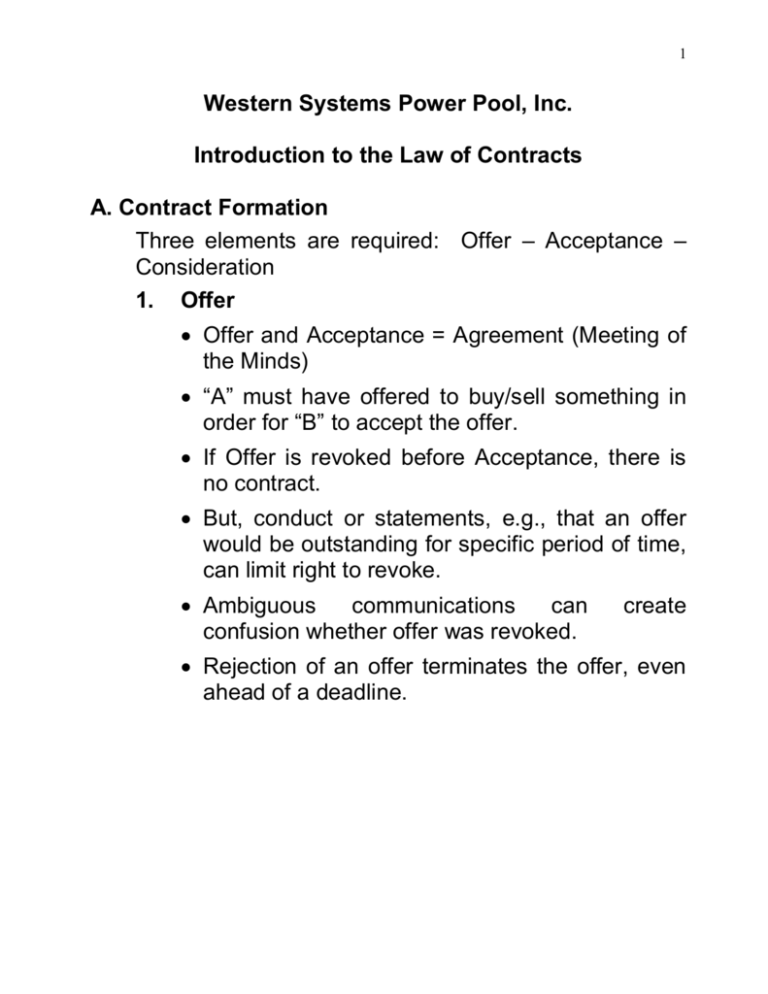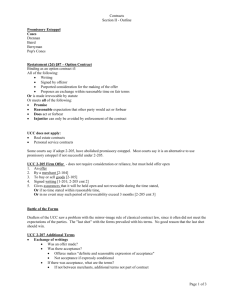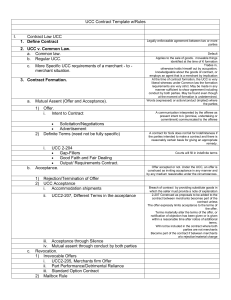Contract Seminar Overhead
advertisement

1 Western Systems Power Pool, Inc. Introduction to the Law of Contracts A. Contract Formation Three elements are required: Offer – Acceptance – Consideration 1. Offer Offer and Acceptance = Agreement (Meeting of the Minds) “A” must have offered to buy/sell something in order for “B” to accept the offer. If Offer is revoked before Acceptance, there is no contract. But, conduct or statements, e.g., that an offer would be outstanding for specific period of time, can limit right to revoke. Ambiguous communications can confusion whether offer was revoked. create Rejection of an offer terminates the offer, even ahead of a deadline. 2 Offer, cont’d More specifically, What Constitutes an Offer: A manifestation of willingness to enter into a bargain, communicated such that a reasonable recipient of the communication would believe that the bargain could be concluded by giving assent -- i.e., by accepting the Offer. Requirement of lntent to Make a Bargain: Offers must be distinguished from invitations to negotiate. Intent is reflected by language and the surrounding circumstances. Even if an important term is omitted, a statement can be an offer if the omission does not indicate a lack of intent to conclude a bargain and the missing term is implied by, e.g., custom or other evidence. RFPs: Solicitation of bids/proposals is not an offer, but responding bids usually are offers. Definiteness of terms: A statement will usually not be considered an offer unless it makes clear the subject matter of the proposed bargain, the quantity involved, and the price, i.e., material terms. 3 Offer, con’d Legal Significance of an Offer: An offer creates a power of acceptance in the addressee, i.e., the power to conclude a bargain and bind the offeror by acceptance. Termination of Offer: The termination of the offeree's power of acceptance may result from any of the following causes: Expiration or lapse: Per stated expiration time, or after a time reasonable under the circumstances. Rejection by the Offeree: Offeree's rejection terminates his power of acceptance even though the power of acceptance would otherwise not have lapsed. Counteroffer: by Offeree is a rejection of the offer and terminates the power of acceptance. Distinguished from: Inquiries (test is whether the inquiry is an inquiry or a rejection) Counteroffer during option period (not terminate offer because there is contractual right to open-offer period 4 Offer, con’d Example – Minneapolis & St. Louis Railway Co. v. Columbus Rolling-Mill Co., 119 U.S. 149 (1886). When defendant offered to sell plaintiff two to five thousand tons of steel, plaintiff rejected the offer by placing an order for twelve hundred tons of steel. By accepting defendant's offered price, but ordering less than the specified quantity, plaintiff made a “qualified acceptance” of defendant's offer—in law a rejection of that offer. UCC Variant: The UCC provides that a definite and seasonable expression of acceptance is acceptance, even if it states terms additional to or different from those offered or agreed upon, but if acceptance to the additional or different terms is made subject to assent, it is a counteroffer (UCC 2-207(1)). What is the UCC? An attempt at commercial utopia? 5 Offer, con’d UCC Effect of additional terms consistent with offered terms (Merchants): If the parties are both merchants, proposed additional terms become part of the contract unless (i) the offer expressly limits acceptance to the offered terms offer; (ii) the additional terms would materially alter the contract; or (iii) the offeror notifies the offeree within a reasonable time of objection to the additional terms (UCC 2-207(2)). But, terms that contradict offer provisions do not become part of the contract; the contract is the offer, the terms agreed in the acceptance, plus terms implied by the UCC to replace conflicting terms (UCC 2-207(2)). Firm offers under Common law: Offer that by its terms is to remain open to a fixed date. Some jurisdictions permit revocation despite firmness. Others preclude revocation if there was reliance. So, under UCC a signed written offer by a merchant to buy or sell goods, which gives assurance that it will be held open, is not revocable for lack of consideration during the time stated (or if no time stated, for a reasonable time), provided that the period of irrevocability can in no event exceed three months (UCC 2-205). 6 2. Acceptance Acceptance is effective only of an outstanding (un-expired, un-rejected, un-revoked) offer. Acceptance must be timely, in accordance with any deadlines of offer. Counteroffer- is a rejection of other party’s offer and itself is an offer. Cannot counteroffer, but then later accept the initial offer. Why not? Counteroffer has same legal status as an offer. Communication of acceptance: When acceptance is made by a communicated promise, the communicated promise is usually the acceptance. Mailbox rule: Where the mail is a reasonable method of communicating acceptance, the acceptance is usually effective on date of mailing, even though the acceptance does not reach the offeror until later date. 7 3. Meeting of the Minds Offer = Acceptance, i.e., did Sam accept what Joe offered? Are the communications clear as to principal terms of the deal: Product, Price, Quantity, Duration of Contract Without Meeting of the Minds, there is no Agreement- no Contract. Contract document (WSPP Confirmation) or other binding proof, e.g. electronic recordings, will establish whether there was meeting of the minds Objective Theory of Contracts: Whether a bargain has been formed by mutual assent of the parties is determined by examining what a reasonable person in the position of each party would be led to believe by the words or conduct of the other party at the time. Although modern contract law rejects the concept that a subjective meeting of the minds is necessary (and instead relies on manifested intentions), if both parties subjectively attach the same meaning to a term, that meaning will govern even if it is not a reasonable meaning of the term. 8 4. Consideration: Exchange of Money or other Value = Mutuality Agreement is enforceable only if supported by an exchange of value: money or mutual performance obligations, or reliance. Consideration is equivalent to a “bargain” (i.e., an exchange of promises or a promise for performance where each party views what it gives as the price for what it gets)—essence of Mutuality. Generally, bargained for promises need not be of equal value. A “peppercorn” or a dollar is enough. But, gross disparity may be used as evidence of defenses such as unconscionability, incapacity, fraud, duress, etc. and may be relevant to availability of equitable relief such as specific performance. Examples where nominal consideration is typical: options and guarantees. Reliance on these undertakings is itself consideration, over and above any cash. 9 Consideration, con’d Examples of No Consideration Promise is illusory: Illusory promise is a statement in form but not substance, because it does not limit the speaker's future options. Agreements to Agree: Unenforceable – “General Motors” agrees to sell its Cadillac Division at a price to be negotiated. But, if a material term is to be set by an objective standard, e.g., CPI or discernible market value, that term will be enforced. Similarly, quantity can float, e.g., allrequirements contracts or all-output contracts. Agreement to do what a party already is required to do lack consideration, but slight changes, e.g. amendments, are enforceable. Agreement of creditor to accept lesser amount is unenforceable unless accompanied by some other value, e.g., payment earlier than required, or creditor agrees to refrain for filing debtor’s involuntary bankruptcy. By statute, however, in some States a creditor’s release in return for partial payment will be enforceable, even without cash consideration. 10 Consideration, con’d The Uniform Commercial Code Uniform statute through States pertaining to sale of goods. Is electricity “goods”? UCC will fill in non-material terms (e.g., UCC 2-305(1) (price); 2-309 (time for delivery and duration of contract); 2-310 (time for payment)). UCC provides that sale-of-goods contracts with unilateral price setting are enforceable. This is not an agreement to agree, it is an agreement that one party agrees to accept the other party’s good faith decision (UCC 2305). UCC adds a best efforts requirement to any lawful agreement for exclusive dealing in goods, e.g., “A” is the exclusive agent for “B” in the Western States (UCC 2-306(2)). 11 5. Other Formation Matters: Statute of Frauds (Get it in writing) Statute of Frauds In General: The Statute of Frauds (every State) requires that certain types of contracts be in writing, or at least evidenced by a signed, written memorandum of essential terms. The basic purpose is to prevent fraud and perjury. UCC Contracts for the sale of goods: Contracts for the sale of goods priced at $500 or more must be written (UCC 2-201). WSPP Agreement provides that electronically recorded telephone calls satisfy the Statute of Frauds. Some Exceptions: Buyer accepts and receives all or part of the goods (result: enforceable contract as to accepted goods) (UCC 2-201(3)(c)); The contract is between merchants and within a reasonable time a written confirmation (which satisfies the Statute as to the sender) is sent and the receiving party does not dispatch a written objection within 10 days (UCC 2201(2)). WSPP methodology? 12 B. Performance and Breach 1. Contract Interpretation Concepts Plain meaning, the touchstone Each word given meaning Provisions construed harmoniously, in context of other provisions Industry terms given customary meaning (e.g., firm, non-firm, capacity, demand, energy) (sometimes meaning not evident) 2. Parole Evidence Rule: no evidence inconsistent with written terms is admissible to determine contract meaning. A fine rule that often has no effect because written terms are unclear. Obligation to Perform in Good Faith: Under modern contract law, each party is obligated to perform in good faith.






